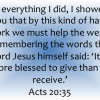Don’t Give Here

Our church is currently going through a five-week series called All In, which is a financial pledge campaign with emphases in being “all in” with the mission of God financially as well as in all other areas of life. The previous campaign our church did started in 2009 and ended in 2012 and this current one will last two years.
Giving to our church is something we love doing because we have bought in to the mission of our church (‘Love God. Love Each Other. Love Our World.’) and we have witnessed how the church has been effective in carrying out its mission. So a campaign like this one that is largely financially focused does not bother or offend us as it might others (aside from that it is sort of taking time away from more intensive Bible Study on other subjects). I can imagine that addressing the topic of giving (and particularly encouraging parishioners to give more) can be very awkward for the preaching pastor and leadership, but I really like how our church has handled it in the past few years.
Our preaching pastor says that it is more important to him that the members/attendees of our church give somewhere than for our church to receive funds to meet its budget. Here is a transcript out of the introduction to the first sermon in this series illustrating this point:
“If it really is a problem for you to hear this because you really can’t get over ‘the church just wants my money’ piece, then I would prefer that you hear these messages and respond by giving somewhere else. I genuinely mean that. I would rather you become a generous person and find a ministry that you really believe in and give there. I would rather that happen than for you to let your inability to trust us keep you from becoming a generous person in God’s kingdom. I mean that. I am more concerned with you becoming generous as a disciple of Jesus than I am with you giving here. Maybe one day we will earn your trust and when we do you can give here. But until then, I am fine with you giving somewhere else – I really am. And so the bigger thing for me is that you become somebody who is actually all in with the mission of God and all in with every part of your life.”
Another piece that I think softens the reception of this message is that every so often our preaching pastor states that the church’s budget is doing just fine – that there are enough members who think that the church is a trustworthy recipient of their money that the church doesn’t need money from any particular marginally invested individual. I think this projects confidence and people respond to that by wanting to back (in this case give to) a “winner” (sort of like all this last-minute election polling). This sentiment parallels nicely with the sermon from this past week on 2 Samuel 7 that God doesn’t need our money.
I think putting the emphasis on the Christian’s act of giving (rather than what the church receives) and stating that the church/God doesn’t need your money makes hearing this encouragement to give much easier for the people who haven’t yet invested financially in the kingdom.
What approach does your church (or any other group that you would consider giving to) take to encourage giving? Do you think the stance I outlined above is attractive? Do you give 10% to one or more organizations aside from your church?

 Why I Tithe
Why I Tithe Where Should We Give?
Where Should We Give? Living a Step Behind
Living a Step Behind Giving Should Exceed Saving?
Giving Should Exceed Saving?


I used to go to a church (that I loved and miss) where we heard a lot of those messages, and at one small group a woman said, “I’m tired of hearing that we always need to give more to help others or the church because sounds like the church doesn’t realize some of us HERE are the people who need help.” Encouraging generosity is good but when it’s always in terms of money, it risks implying people who arent comfortable people who can give money don’t really belong. That language is particularly common in churches I’ve gone to with very heavy social justice missions, but also just as a symptom of mostly middle class white congregations, and that is NOT what the church is supposed to be about. I’m not sure what the solution is but I think it’s important to be aware and maybe also talk about other ways to be generous, rather than just measuring generosity in cash terms.
PS In answer to your last question, only about 1/3 of my giving goes to my church, and most of the rest goes to the local food bank. My community has been going through really bad times economically, and I feel my small contributions are more needed there than in my church.
I feel two ways about the point you’re making – I mean, I don’t disagree that a spirit of generosity can be broadly displayed, financially and otherwise, but I also think it’s consistent with Scripture to emphasize money because it is for most people money is the most difficult avenue through which to be generous. But I agree that the church should have within its midst people who need help as well as can give it (widows and orphans or whatever the modern-day equivalent) and that some messages about giving could make them feel marginalized. Maybe the heaviest emphasis should just be on the fact that giving is an act of worship in response to what Jesus has done for us and essentially a communication between the giver and God.
I will just add, though, that the couple that was most instrumental in leading me to be obedient to tithe was going through unemployment at the time.
My current church is almost too small to do anything formal. But the “church ladies” know who has extra food or space or whatever if someone from the community is in need. (My church is in a very small town.)
I feel like my parents’ church (the one I grew up in) was fumbling and awkward about raising money. In addition to slipping extra donation envelopes to families, they would often make house calls when they thought a family wasn’t giving the “right” amount and would try to sell them on giving more.
SWR recently posted..Having a baby in grad school?
Wow, that’s some serious strong-arming! I always wonder how churches estimate the income of their attendees and use that to compare with how much is given. Ours uses the median/average income in our metro area in place of the median/average income of attendees, but that’s a big assumption, and can only even sort of work at a statistical level.
Our church is huge so a lot of things go through formal channels (e.g., housing for medical refugees) or through an individual small group (e.g. grocery money for a struggling family).
I grew up going to a small church in a very rural, lower middle class (and below) setting. As such, not many parishoners had much money to give. Mostly we were encouraged to volunteer and give gifts-in-kind. How the church made most of it’s income was fundraisers, such as a ham dinner that was very popular in the community. That event alone brought in about a third of the opporating budget.
Edward Antrobus recently posted..A Day in the Life of Road Construction
The concept is foreign to me – I’ve only been part of this one church and it doesn’t do community events as fundraisers. The one you describe sounds startlingly successful, though. Did that church have full-time staff and its own building? I would think those would be quite expensive.
The do have their own building. About half an acre of land with three buildings. But it was bought about 150 years ago so no mortgage and, of course, it’s exempt from property taxes. Building expenses are electricity, water, telephone and oil, plus gas for the lawn mower.
They only have a part-time pastor now, but they used to have a full-time one, plus a woman who makes $50/week cleaning the building.
Edward Antrobus recently posted..A Day in the Life of Road Construction
Being part of a community is incredibly important. Giving time and money is something we all should do because we receive far more than we give. I still find it weird that some people (probably many people, right?) don’t understand that.
AverageJoe recently posted..Taking a Body to the Morgue: A (Surprisingly) Bad First Day Of Work
I totally agree. I can see how much I’ve been changed by practicing intentional giving. It’s my main weapon against the idol of security. Plus it does give me connections to my community that I didn’t have before.
I love that your church put it that way. This is what the church should be doing- making a positive difference in the world. Carrying on the good work!
Wayne @ Young Family Finance recently posted..Is gaming online worth it?
Well, we certainly trust our church to make a positive difference in the world – that’s why we give there!
“I think putting the emphasis on the Christian’s act of giving (rather than what the church receives) and stating that the church/God doesn’t need your money makes hearing this encouragement to give much easier for the people who haven’t yet invested financially in the kingdom.”
Definitely agree! Our church hasn’t exactly been fiscally responsible…I won’t get into it right now but I think they are slowly turning a corner. I feel more compelled to give to other charities for the time being but I do think giving this sort of message can really make people feel more comfortable about the topic, because ultimately it is about the wider kingdom than about a specific church.
DC @ Young Adult Money recently posted..When a Renovation/Addition is NOT Worth It
Wow, I’m sure that’s quite a story. Good for you for sticking with your church and seeing it come around. I would probably give elsewhere for a while if I didn’t trust what they were doing with the money. But ultimately it’s our faithfulness that matters, not where the money ends up – though we should practice good stewardship as best we can.
I grew up LDS, and members tithed, or paid 10% of what they earned. It’s a hard concept for people on the outside…they see people struggling and still giving 10%. But even though I no longer practice that religion, I still have a deep respect for those who faithfully observe that law…especially when it’s difficult to do so. In their case it’s more about obedience and faith than finances.
femmefrugality recently posted..When Procrastination is Frugal: Free Shipping Day
If you have an income at all, I think there is a responsibility to share some of it – especially in the US where nearly all of us are in the top tier of the richest people in the world. The giver benefits no matter where the money goes, but I guess that is hard to understand from an “I need all my money!” mindset.